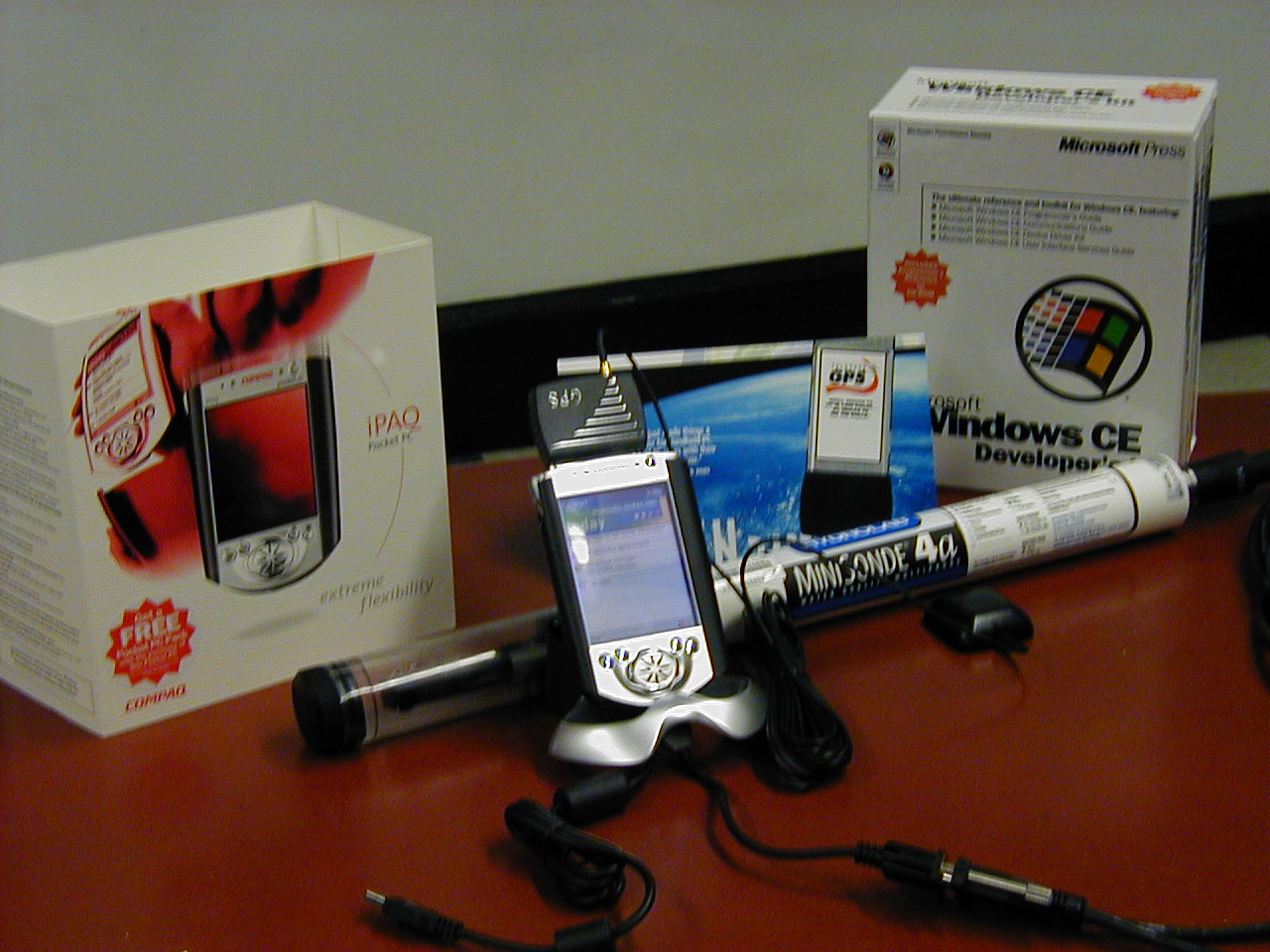Software Tools for Environmental Study
|
 Enrique R. Vivoni - MIT Parsons Laboratory
Enrique R. Vivoni - MIT Parsons LaboratoryTraditional field sampling and measurements still largely depend upon pencil and paper field notebook for data collection and recording. Many environmental engineers have yearned for a more efficient, timesaving and accurate means for recording their important field data. Laptops are a possible remedy, but their bulkiness and fragility pose serious difficulties. Field engineers, scientists and mobile workers, in general, have lacked the appropriate technology to carry out their work in an efficient manner.
In the last three years, there have been great advances in mobile computing and a widespread proliferation of handheld PDAs (Personal Digital Assistants). PDAs provide new potential for developing software tools to assist environmental and civil engineers in improving the collection of field data, whether this data be related to transportation studies, environmental assessments or project management. Many engineering disciplines with a field work or field inspection component could greatly benefit from these computing tools
The ENVIT Student Group has been formed at MIT with the goal of creating Mobile Field Data Collection Software for the Environmental Professional. The first step in this project will be the creation of the STEFS software package (Software Tools for Environmental Study). The ENVIT Student Group currently consists of 24 student members from various degree levels within the CEE Department (Undergraduate, UROP, M.Eng. and PhD).
The student members of ENVIT will develop a mobile software application intended to streamline the data collection process and improve the accuracy of environmental field data as compared to current practices. The STEFS project is focused on creating an electronic field notebook application that integrates the tasks of collecting data from environmental and geopositional sensors, storing the data, making computations in the field based on the data, and displaying the data to the field worker. By using mobile mapping technology and a GPS sensor, the electronic field notebook adds a new dimension of spatial localization to the data collection process. ENVIT-Note includes various new technologies for mobile computing, including the use of Compaq Ipaq computers, Teletype GPS sensors for Ipaq, Hydrolab multi-parameter water quality probes, Global Water open channel flow meters, ESRI ArcPad Mobil GIS and Windows CE development using embedded Visual Basic, C++ and Access. The integrated system will provide accurate efficient and inexpensive environmental and geopositional data gathering through GIS/GPS/sensor technology.
DevelopmentAs part of the STEFS project, the ENVIT student group is sponsoring and undergraduate seminar in the CEE Department during the Fall 2001 term. Course 1.992 is intended to serve as a springboard for prototype development by CEE environmental engineering majors. In addition, the seminar introduces students to mobile computing, programming for the Windows CE platform, technologies for field studies and entrepreneurship related to the product development. This is being achieved through a series of guest lecturers (MIT faculty, staff and alumni) and hands on programming practice with in the CEE Department's Design Studio of the Future facility (Room 1-131). Participants include Amy Watson '02, Arthur Fitzmaurice '03, Nancy Choi '02, Laura Rubiano-Gomez '04, Trisha McAndrews '03, James Brady '03, Brian Loux '04, Aurora Kagawa '03, Chrissy Dobson '03, Linda Liang '03, Kim Schwing '03, Anna Leos-Urbel '02 and Lisa Walters '04.
In support of these efforts the ENVIT officers as well as UROP and M.Eng researchers are also developing portions of the software during the fall and spring terms. Three UROP researchers (Keyuan Xu '04, Rose Liu '04, and Kan Liu '02) and several Cee Masters of Engineering students are working on distinct facets of the current prototype development and on future enhancements to the product. The entire effort is being led by the ENVIT officers (Enrique Vivoni, '96, '98 Richard Camilli '99 and Mario Rodriquez '00) with support from and Advisory board composed of Daniel Sheehan (MIT Information Systems), Sheila Frankel (Parsons Laboratory) and Prof. Dara Entekhabi (Parsons Laboratory).
Field TestingThe STEFS prototype will be field tested within the context of a water quality and quantity sampling study in the Australian watersheds as part of a watershed management study. Field-testing will be conducted as part of a broader IAP field trip to New Zealand and Australia organized and led by Sheila Frankel of Parsons Laboratory. The field trip to Australia and New Zealand will be focused on studying the Hawkesbury-Nepean Watershed near Sydney, Australia as an example of a watershed under anthropogenic stress. Field sampling of water quality and quantity within the watershed will be undertaken in support of an on-going water quality study in the region. In addition to testing the software prototype, the field data will be used to verify collected GIS maps for the area and to supplement a database for modeling the hydrology and water quantity in the area through numerical models.
Following the field trip, the results of the field testing of the ENVIT-Note application and the various software and hardware components will be incorporated into possible enhancements for the prototype. The final product will be used in subsequent laboratory and field courses within the CEE department.